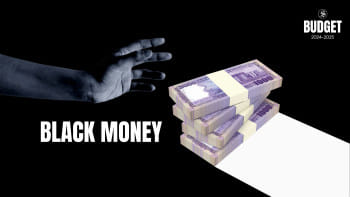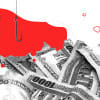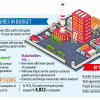Another mostly disappointing budget

The finance minister on Thursday unveiled the country's 54th budget amounting to Tk 7,97,000 crore for FY2024-25, which is 4.6 percent bigger than the current one. The increase in budget size, however, is much lower than the year-on-year average spike of 11 percent seen in the last five years, illustrating the monetary constraints the government is facing as well as some of the realities of the crisis which requires a certain degree of belt-tightening. The main aim of this budget had to be the restoration of macroeconomic stability, reduction of inflation, and containment of ongoing pressure on our foreign currency reserves, which the finance minister himself admitted. On top of that, the finance minister emphasised the need to address corruption but then offered a facility to whiten black money, which is a contradiction in itself.
It means that firms and individuals with black money will again have the opportunity to legalise their undeclared wealth without having to face any questions about the source of their income, paying a 15 percent tax, whereas people belonging to the highest tax slab will have to pay a 30 percent tax, compared to 25 percent last year. This once again raises the question: why is the budget favouring corrupt people and companies over honest and hardworking individuals? And why are our laws continually being formulated in a way that makes honest individuals lose out to corrupt ones? It would not be far-fetched for honest taxpayers to ask, what is the point of them paying taxes every year when those who are evading taxes can get away with paying a much lesser amount on their undeclared income to bring it into the mainstream.
As far as allocations are concerned, while on the one hand the government has had to reign in its expenditure, it is disappointing to see, on the other hand, where the government's priorities truly lie. They certainly do not lie in the education or healthcare sectors, which is worrying. The allocation for education actually went down from 1.76 percent of GDP in the last budget to 1.69 percent in the proposed one—the lowest in the last 16 years. If the government is really looking to create a "Smart Bangladesh," how can such a low allocation be justified? And the same applies for the healthcare sector, whose budgetary allocation went slightly up from 5 percent of GDP in the last budget to 5.19 percent of GDP in the upcoming one—a negligible increase. In a country having one of the highest out-of-pocket healthcare expenditures in the world and experiencing soaring inflation simultaneously, healthcare costs have become a massive burden for the people. Therefore, the sector deserved a much greater allocation (and attention) from the government than what it received.
However, on a more positive note, it is good to see the government allocate Tk 2,000 crore for health emergencies, which we hope would be used properly to provide some relief to struggling families. Additionally, we are encouraged to see the government allocate Tk 1,000 crore on health research, similar to the current budget's allocation. However, questions remain over the ministry's ability to utilise its budget as, according to a review, there was a significant decrease in budgetary use compared to the allocation in the last fiscal year. Experts have urged that there should not be a repeat of that going forward. So, it is vital that the government increases the capacity of the health sector—as well as the education sector—to actually absorb and properly utilise their respective budgetary allocations.
The budget deficit this time is historically lower than other budgets in the last decade. This gives the impression that the authorities are concerned about financing the budgetary deficit, as well as servicing the debt. It shows that the authorities have taken a very practical decision. But again, the way the allocations have been made shows that the authorities have failed to take into account what common people are most concerned about. And while the government's growth estimates seem to be more practical compared to previous, overly optimistic approximations, the setting of a 6.5 percent inflation target seems completely oblivious to the current reality, with the average inflation remaining around 9 percent for the past two years.
These contradictions and inadequacies, as well as the lack of specific strategies to address what has been the worst economic crisis facing the country since the Covid-19 pandemic, show that even though the budget admits to the existence of this crisis, it does not provide any real way out of it. And here is where it falls woefully short of what the country needed at this moment. We hope that before giving its final seal of approval on the budget, the government will genuinely take these and other concerns raised by experts into account.


 For all latest news, follow The Daily Star's Google News channel.
For all latest news, follow The Daily Star's Google News channel. 












Comments